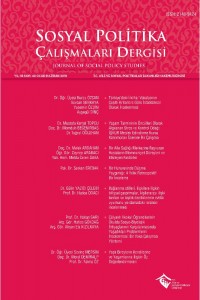PERCIEVED STRESS AND LOCUS OF CONTROL AS DETERMINANTS OF LIFE SATISFACTION: A STUDY ON THE PARTICIPANTS OF İŞKUR VOCATIONAL COURSE
Öz
This study researches the effects of perceived
stress, locus of control, and demographic factors on life satisfaction of the
unemployed, seeking a job and participating in vocational training financed by
İŞKUR. The study shows that level of perceived stress is average whilst mean of
coping strategies is a bit higher than average. Similarly, life satisfaction of
participants is a bit higher than average. It is contended that there is
positive and significant relation between perceived stress and life
satisfaction. We may conclude that stress is beneficial during job-seeking
process and adopting coping strategies may positively affect life satisfaction.
Another finding is that relation between locus of control and life satisfaction
is positive and significant. Therefore, satisfaction level of trainees with
external locus of control is higher than that with internal locus of control
Anahtar Kelimeler
Kaynakça
- Abbey, A. ve Andrews, F. M. (1985). Modeling the psychological determinants of life quality. Social Indicators Research, 16(1), 1-34.
- APA (American Psychological Association) (2015). Stress in America: Paying With Our Health, www.stressinamerica.org, Erişim Tarihi: 29.01.2017.
- Arrindell, W. A., Meeuwesen, L., ve Huyse, F. J. (1991). The Satisfaction With Life Scale (SWLS): Psychometric properties in a non-psychiatric medical outpatients sample. Personality and Individual Differences, 12(2), 117-123.
- Baltaş, Z., Atakuman, Y., ve Duman, Y. (1998). Standardization of the PerceivedStress Scale: Perceived Stress in Turkish Middle Managers. Stress and Anxiety Research Society, 19th International Conference, İstanbul.
- Basım, A. (2016). Algılanan Streste Duygusal Emek ve Kendilik Değerlendirmelerinin Rolü: Avukatlar Üzerine Bir Araştırma, Yayımlanmamış Yüksek Lisans Tezi, Türk Hava Kurumu Üniversitesi Sosyal Bilimler Enstitüsü, Ankara.
- Cohen, S., Kamarck, T., ve Mermelstein, R. (1983). A global measure of perceived stress. Journal of Health Social Behavior, 24, 385-396.
- Creed, P. A., ve Bartrum, D. A. (2008). Personal Control as a Mediator and Moderator Between Life Strains and Psychological Well-Being in the Unemployed. Journal of Applied Social Psychology, 38(2), 460-481.
- Dağ, İ. (2002). Locus of control scale: Scale development, reliability and validity study. Türk Psikoloji Dergisi, 17(49), 77-92.
- Diener. E. (1984). Subjective well-being. Psychological Bulletin. 95, 542-575.
- Diener. E., Emmons, R. A., Larsen. R. J., ve Griffin, S. (1985). The Satisfaction With Life Scale. Journal of Personality Assessment. 49. 71-75.
YAŞAM TATMİNİNİN ÖNCÜLLERİ OLARAK ALGILANAN STRES VE KONTROL ODAĞI: İŞKUR MESLEK EDİNDİRME KURSU KATILIMCILARI ÜZERİNE BİR ÇALIŞMA
Öz
Bu çalışmada İŞKUR tarafından finanse edilen meslek
edindirme kurslarına katılan iş arama eğiliminde bulunan işsizlerin algılanan
stresleri, kontrol odakları ve demografik özelliklerinin yaşam tatminlerini
nasıl etkiledikleri araştırılmıştır. Araştırma, algılanan stres seviyesinin
ortalama seviyede olması ile birlikte stresle mücadele ortalamasının nispeten
daha yüksek bir seviyede olduğunu ortaya koymaktadır. Katılımcıların yaşam
tatminlerinin de ortalama düzeyde olduğu tespit edilmiştir. Araştırmada
algılanan stres ile yaşam tatmini arasında anlamlı ve aynı yönlü bir ilişki olduğu
belirlenmiştir. Buradan hareketle, iş arama döneminde stresin faydalı
olabileceği ve stresle mücadele yaklaşımlarının benimsenmesinin yaşam tatmini
de olumlu etkileyebileceği sonucuna varılabilir. Çalışmada ulaşılan diğer bir
konu da kontrol odağı ile yaşam tatmini arasında anlamlı ve aynı yönlü bir
ilişki bulunmasıdır. Bu nedenle, dış kontrol odaklı kursiyerlerin iç kontrol
odaklılara kıyasla daha fazla yaşam tatmini sağladığı ifade edilebilir.
Anahtar Kelimeler
Kaynakça
- Abbey, A. ve Andrews, F. M. (1985). Modeling the psychological determinants of life quality. Social Indicators Research, 16(1), 1-34.
- APA (American Psychological Association) (2015). Stress in America: Paying With Our Health, www.stressinamerica.org, Erişim Tarihi: 29.01.2017.
- Arrindell, W. A., Meeuwesen, L., ve Huyse, F. J. (1991). The Satisfaction With Life Scale (SWLS): Psychometric properties in a non-psychiatric medical outpatients sample. Personality and Individual Differences, 12(2), 117-123.
- Baltaş, Z., Atakuman, Y., ve Duman, Y. (1998). Standardization of the PerceivedStress Scale: Perceived Stress in Turkish Middle Managers. Stress and Anxiety Research Society, 19th International Conference, İstanbul.
- Basım, A. (2016). Algılanan Streste Duygusal Emek ve Kendilik Değerlendirmelerinin Rolü: Avukatlar Üzerine Bir Araştırma, Yayımlanmamış Yüksek Lisans Tezi, Türk Hava Kurumu Üniversitesi Sosyal Bilimler Enstitüsü, Ankara.
- Cohen, S., Kamarck, T., ve Mermelstein, R. (1983). A global measure of perceived stress. Journal of Health Social Behavior, 24, 385-396.
- Creed, P. A., ve Bartrum, D. A. (2008). Personal Control as a Mediator and Moderator Between Life Strains and Psychological Well-Being in the Unemployed. Journal of Applied Social Psychology, 38(2), 460-481.
- Dağ, İ. (2002). Locus of control scale: Scale development, reliability and validity study. Türk Psikoloji Dergisi, 17(49), 77-92.
- Diener. E. (1984). Subjective well-being. Psychological Bulletin. 95, 542-575.
- Diener. E., Emmons, R. A., Larsen. R. J., ve Griffin, S. (1985). The Satisfaction With Life Scale. Journal of Personality Assessment. 49. 71-75.
Ayrıntılar
| Birincil Dil | Türkçe |
|---|---|
| Bölüm | Makaleler |
| Yazarlar | |
| Yayımlanma Tarihi | 27 Haziran 2018 |
| Yayımlandığı Sayı | Yıl 2018 Sayı: 40 |


